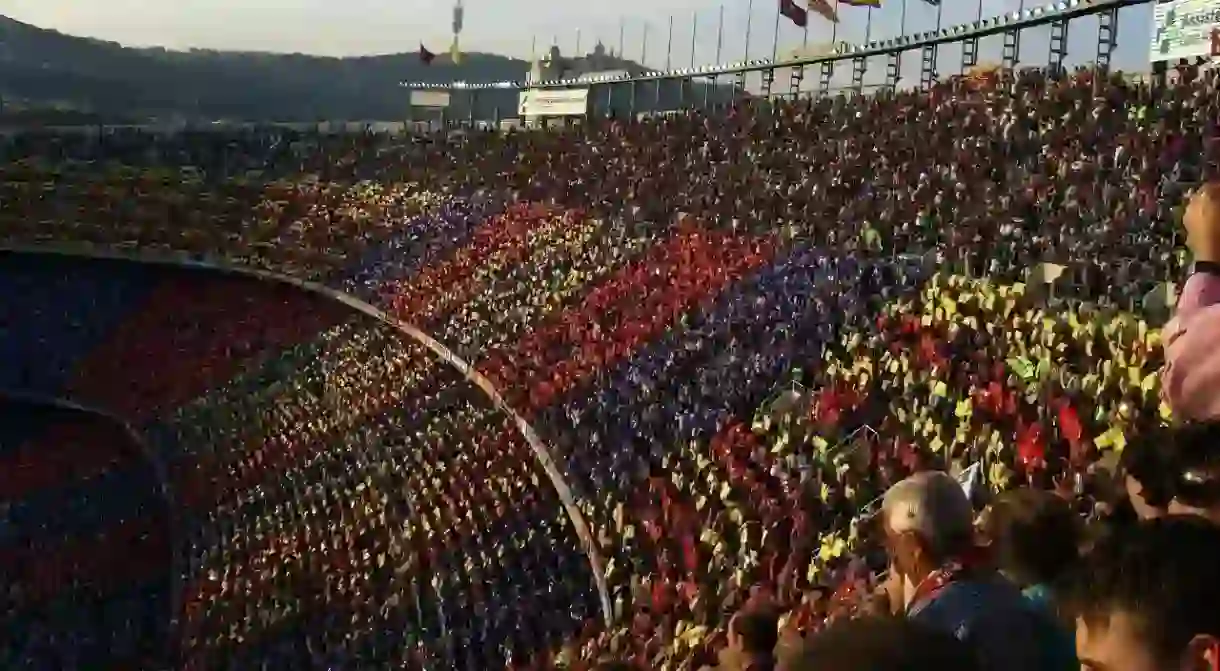A Brief History Of FC Barcelona

One of the most popular football clubs in the world, FC Barcelona or ‘Barça’ as it’s known by fans, is also one of the most successful clubs in the history of the sport worldwide. We look back at the history of this sporting success story.
The origins of the club date back to the turn of the 20th century, when a Swiss football aficionado named Hans Gamper placed an advert in a local paper expressing his wish to organize football matches in the city. Soon, the first Barcelona team was formed and in 1909 they acquired the Camp de la Indústria pitch, their first stadium and home of the club. From very early on the club represented much more than just a sports team, but a symbol of Catalan identity and pride.
The team switched its official language from Spanish to Catalan in the early 20th century and for many, membership to the team was a sign of membership to the wider Catalan community. To this day the club’s motto is ‘Més que un club‘ which means ‘more than a club’. Unsurprisingly perhaps, there is an ongoing rivalry between FB Barcelona and Real Madrid who confront each other regularly in matches known as ‘El Clásico‘.

The period surrounding the Spanish Civil War was a time of decline and trouble for the club, with many of its players and supporters either involved directly or indirectly with the events of the war. Many of the key figures of FC Barcelona at the time were openly against the Falangist movement and in a remarkable attack, the pro-independence club president Josep Sunyol was murdered by Falangist soldiers. The Catalan language, flag and other symbols were all banned during the Francoist dictatorship, and this resulted in its name being forcibly changed to ‘Club de Fútbol Barcelona‘ or CF Barcelona until 1974.
However, even under political duress, the team and its supporters continued to represent a pro-independence, anti-Franco spirit, captured by events such as one day in 1951 when the thousands of supporters who had watched the match refused to take the tram back to the city, preferring to walk in the rain instead in support of the local tram-workers who had staged a strike against the authorities.
Despite the political and social instability of the time, the team enjoyed national success during the 1950s but suffered in the 1960s, owing to the fact that they had recently paid for the construction of the emblematic Camp Nou stadium. This left them with little funds with which to acquire new players. However from 1970 onwards the club had a revival of fortunes and in the following years Barcelona signed some of the world’s greatest players, including Johann Cruyff who was signed in 1973 and won the Ballon d’Or twice with the team; and Diego Maradona who was signed in the 1980s for a record-breaking £5 million.

Arguably, no era was more significant for the club than the 1990s and the moment Johan Cruyff returned to the team as manager. In the late 1970s the club had invested in an old farm house known as ‘La Masia‘ which was to be the training ground and home for the club’s youth program, and the arrival of the first set of graduates corresponded with Cruyff’s return. These graduates included Pep Guardiola, who later would go on to be one of the club’s most successful managers himself. This team, guided by Cruyff revolutionized the way Barcelona would play football. Their philosophy is known the world over as ‘Total Football’, a style of play in which players have complete freedom to move across positions while the underlying structure on the field is maintained by others who replace him.
This has become Barcelona’s most unique and recognizable trait, although other clubs have begun to copy the style. Under Cruyff, the team won four successful La Liga championships (1991-1994), the 1992 European Cup, the 1990 Copa del Rey and a number of other large competitions which would result in Cruyff being considered the most successful Barcelona manager of all times. His legacy could still be felt when he passed away in early 2016, as supporters and football fans across the world paid homage to him in and out of the stadiums.

FC Barcelona has continued this success ever since, winning 24 La Liga, 28 Copa del Rey and five UEFA Champions League competitions. They continue to attract some of the world’s greatest players including global superstars like Andrés Iniesta, Xavi (Xavier Hernandez), Lionel Messi, Luis Suarez and Neymar (Neymar da Silva Santos Júnior).
One of the features of FC Barcelona that undoubtedly contributes to the team’s local popularity and widespread support is the fact that the club is one of the few in the world to be owned by the club members themselves. Unlike many big European clubs which are owned by rich investors, FC Barcelona is owned by the 170,000 or more members, known as ‘soçis‘, who elect the president. The club only operates with the money it earns through games, merchandise, television rights, etc. and were recently ranked the fourth richest football team in the world. It has one of the largest social media followings of any sports team in the world and is the most popular ‘second favorite team’ in Europe. The club’s history, its wider cultural symbolism and its record-breaking performance throughout the years have undoubtedly earned it a place among the few great sports teams of all time.













